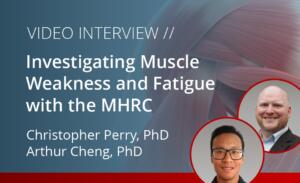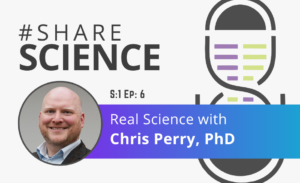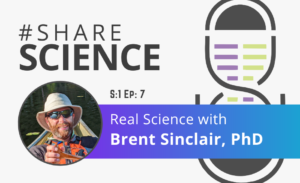The Future of Muscle Physiology: Student Research at the MHRC
Although they are an integral part of academia, students do not always have the opportunity to share their research, goals, and findings with a wide audience. In this blog post, we summarize an interview with three students from the Muscle Health Research Centre (MHRC) at York University who conduct fascinating research in the field of muscle physiology.
Sternocleidomastoid muscle’s response to injury
We begin with Christina Amaral, a PhD candidate under the supervision of Dr. Loriann Hynes in the Whiplash and Head Injury Prevention/Rehabilitation lab. Dr. Hynes is a certified athletic therapist whose laboratory investigates how different bodily systems work together to respond to injury and rehabilitation, with the core focus being the musculoskeletal system.
“The main focus [of Dr. Hynes lab] is on the integrative nature of the body’s systems in response to both injury and rehab.”
One particular muscle of interest for this laboratory is the sternocleidomastoid muscle (SCM), which rotates and supports the head and is commonly associated with many head and neck injuries. Dr. Hynes’ laboratory is interested in how the SCM responds to head injuries, and how this may influence the ability of the anterior vascular system to supply blood flow to the neck and brain. A muscle’s response to injury heavily depends on the manner and severity of the injury; factors like age, previous injury, and overall health can all impact muscle recovery and rehabilitation.
Christina is currently exploring a novel method of applying a cognitive motor integration task (i.e., responding to visual cues) during a running activity to rehabilitate individuals with concussions. Through this methodology, Christina is able to look at how the muscular and nervous systems integrate post-concussion, and hopes to return these individuals to their pre-concussion activity levels.
Interstitial glucose and fatigue
We next speak with Mohamed Elsayed Elghobashy, a third year undergraduate student in Dr. Arthur Cheng’s laboratory. Dr. Cheng aims to understand the physiological pathways of fatigue in the neuromuscular system in both healthy and unwell populations, and how this could be used for fatigue treatment and mitigation. Myalgic encephalomyelitis, also known as chronic fatigue syndrome, is a major focus for Dr. Cheng’s laboratory as a cure for this illness remains elusive.
Mohamed is currently investigating the links between interstitial glucose concentrations and fatigue within the cortical and intramuscular system with the goal of helping athletes optimize their carbohydrate intake during exercise for peak performance. If you’d like to learn more about Dr. Cheng’s laboratory and research, click here!
“[Dr. Cheng’s] lab aims to understand physiological pathways that lead to fatigue at the nervous and muscular levels in healthy and diseased populations and the translation of this onto potential methods of treatment and mitigation.”
Immunity, inflammation, and exercise
Our final interviewee is Mayoorey Murugathasan, a PhD candidate in Dr. Ali Abdul-Sater’s laboratory. Mayoorey aims to understand and improve innate immunity by researching how exercise can be used to train the immune system to produce a desired inflammatory response. Previous studies have shown that long-term exercise programs can train bone marrow progenitor cells towards an anti-inflammatory response that can control secondary inflammation. Based on this research, Mayoorey hopes to design exercise therapy programs that promote a beneficial inflammatory response. Additionally, Mayoorey investigates the role of individual interferons in antiviral and antibacterial responses through in vivo and in vitro studies of knock-out mice.
Additional educational content
For this blog, we summarize interviews with two professors from the MHRC who investigate the mechanisms of muscle weakness and fatigue: Christopher Perry and Arthur Cheng from York University’s Muscle Health Research Centre (MHRC).
This episode of Share Science features Christopher Perry, PhD, an Associate Professor at York University, who shares his career path, but also his ideas and goals to further help those with muscle disease and to provide more opportunities for his trainees.
This episode of Share Science features Brent Sinclair, PhD, a biology professor at Western University who researches insect thermal biology and organizes career events for graduate students.


